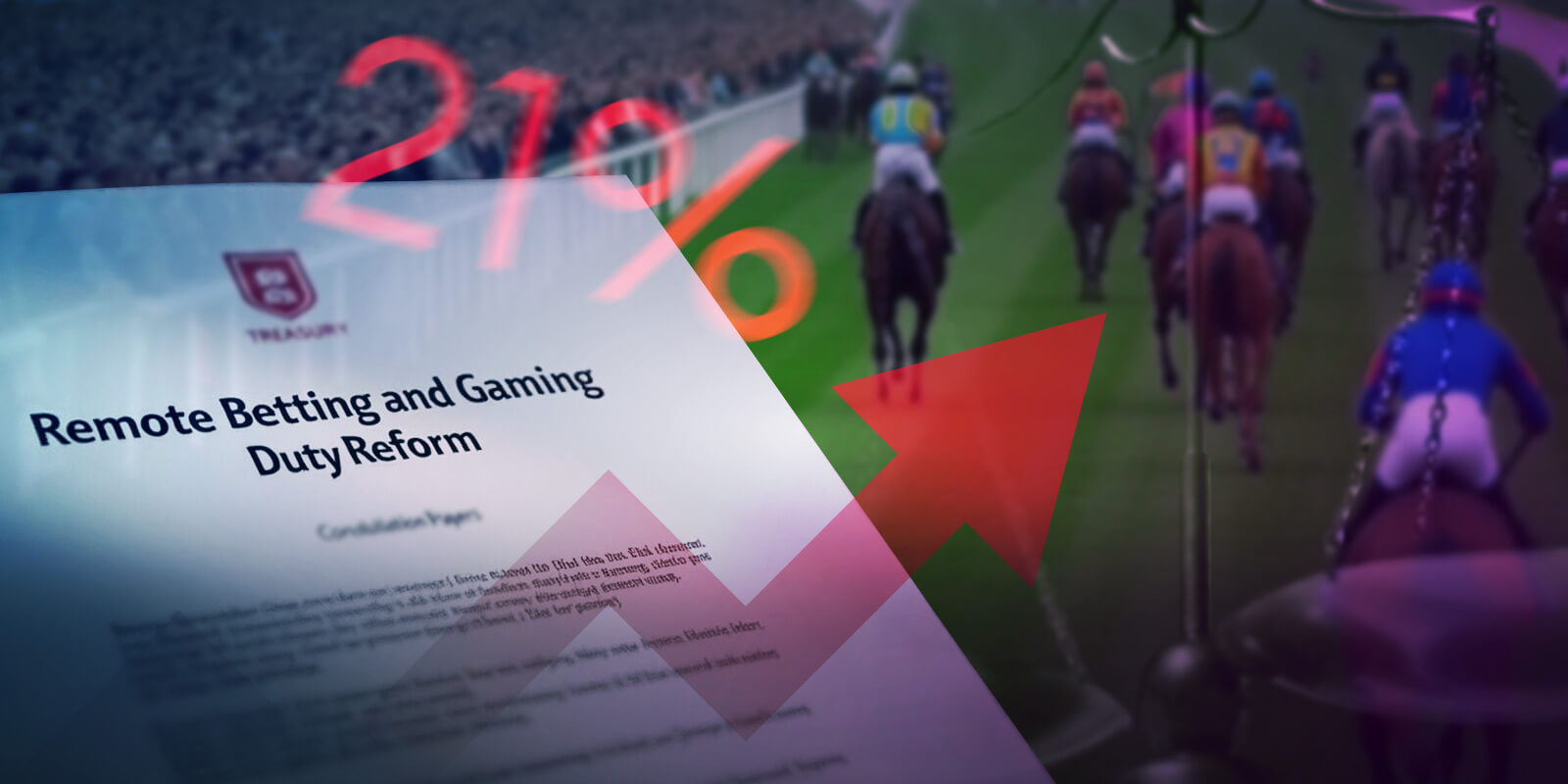UK Treasury Engages with British Racing Over Potential Impacts of Gambling Tax Proposals

Affiliate Disclosure : We earn a commission from partners links on BetterGambling. Commissions do not affect our editors' reviews, recommendations, or ratings.
The UK government is currently consulting on proposed changes to the Remote Betting and Gaming Duty (RBGD), the tax paid by online gambling operators based on their gross gambling earnings. The government’s plan is to replace the existing three-tier system, with a single, flat tax rate for all online gambling activities.
Crucially for the horseracing industry, this proposed single rate could mean that revenue generated from online bets placed on horseracing would be taxed at the same level as higher-margin online casino games and slots, potentially at the highest rate of 21%.
- How the Proposed Online Betting Tax Reform Compares to the Current System
- Racing Industry Pushes Back – “Gravest Risk” in Years
- Government Dialogue and Treasury Response
- Betting Industry Warns – “No Carve-Out” Possible
- What’s at Stake for British Horse Racing?
- What Happens Next?
- Sources & Further Reading
How the Proposed Online Betting Tax Reform Compares to the Current System
| Tax System Aspect | Current RBGD Structure | Proposed Changes | Impact on Racing |
|---|---|---|---|
| Tax Rates | 15%, 20%, 21% (tiered by operator size) | Single flat rate (potentially up to 21%) | Racing bets taxed same as high-margin casino games |
| System Structure | Three-tier system based on operator earnings | Unified rate for all online gambling | Loss of preferential treatment for lower-margin betting |
| Projected Annual Impact | Current funding maintained | Not yet determined | BHA estimates £66-160 million potential loss to racing |
The public consultation on these proposals is open until 21st July 2025, with a decision on the final tax rate and structure expected in the Autumn Budget.
Racing Industry Pushes Back – “Gravest Risk” in Years
The British Horseracing Authority (BHA), which projects potential annual losses of between £66 million and £160 million, argues that such a substantial reduction in funding would have far-reaching consequences, including job losses across, potential closure of rural racecourses, and a drastic drop in prize money.
The BHA did not mince words in their initial assessment of the potential impact, labelling the government’s proposals as “one of the gravest risks” the sport has faced in many years.
Government Dialogue and Treasury Response
During a recent discussion in the House of Commons, James Murray MP, the Financial Secretary to the Treasury, committed the government to using the consultation period to “identify unintended consequences” of the proposals and affirmed the Treasury’s intent to “continue close dialogue” with affected sectors, including racing.
Labour MP Sally Jameson also highlighted the considerable economic value of the horseracing industry.
While these comments indicate the government is listening and willing to involve stakeholders in the consultation process, there have been no direct mentions of plans to alter the core proposal or creating an exemption for racing.
Betting Industry Warns – “No Carve-Out” Possible
The regulated betting industry—through the Betting and Gaming Council (BGC)—has also voiced concerns about the potential impact of the proposals.
BGC CEO Grainne Hurst says taxing horseracing betting at the same rate as higher-margin products like online slots would be detrimental not only to racing but also to the overall health of the regulated betting market in the UK.
According to the BGC, it is practically impossible to isolate and tax horserace betting revenue entirely separately from other online products, as costs are intertwined throughout the business model.
The council is also suggesting that increased costs for licensed operators could lead to punters migrating to the unregulated black market, where they will be unprotected.
What’s at Stake for British Horse Racing?
British horse racing supports over 85,000 jobs and is the UK’s second-most attended sport. The proposed changes threaten critical funding streams that support various vital aspects of the sport:
- Funding for equine welfare initiatives and care programmes;
- The value of media rights deals and sponsorship revenues;
- Investment in training facilities and grassroots participation.
These potential threats arrive at a challenging time for the sport, which is already battling the introduction of mandatory affordability checks for punters and ongoing debates about whether the current Levy system adequately funds racing.
Findings from a recent report by the All Party Parliamentary Group (APPG) for Racing and Bloodstock have also reinforced many of these vulnerabilities, providing additional political context to the industry’s financial concerns.
A Precedent from Abroad?
While the UK’s situation has its unique characteristics, international examples offer some lessons. Ireland introduced a 2% turnover tax for betting in 2019, and Australia operates under a point-of-consumption tax model. These changes have been linked to market exits by some operators and further consolidation within the bookmaker landscape, suggesting significant tax adjustments can indeed reshape betting markets.
What Happens Next?
The consultation process concludes on 21st July 2025, after which the government will review the submissions received from stakeholders. The specific details of the new unified tax rate, and how it will apply across different online gambling verticals including horseracing, are expected to be formally announced in the Chancellor’s Autumn Budget later this year.
In the interim, both the BHA and the BGC are anticipated to get on with their lobbying efforts, presenting detailed economic arguments to government ministers and officials in an attempt to shape the final outcome.
Sources & Further Reading
- Racing Post: Treasury working with racing to identify ‘unintended consequences’ of gambling tax proposals
- SBC News – BHA calls on MPs to ‘Axe the Racing Tax’
- British Horseracing Authority – BHA urges the sport to call on Government to Axe the Racing Tax as sport threatened with £66m in lost income
- The Guardian – Making sense of racing’s ‘£3bn black hole’ and affordability checks row
- The Irish Times – Budget 2019: Betting tax to double to 2%
Recommended from BetterGambling

Gaming Corps Lands MrQ and Buzz Bingo Deals: Major UK Casino Content Expansion
The Swedish gaming company Gaming Corps made two big content deals this month that will help it get a bigger share of the UK market in December 2025. These arrangements added its catalogue of slots and instant-win games to the MrQ and Buzz Bingo platforms, which together serve over one million British players. The company, […]
1 month, 3 weeks ago2 min
Football Betting Market Size & Trends in the UK: 2025 and Beyond
Online sports betting in the UK pulls in £2.4 billion a year. Add land-based gambling and the total jumps to £15.6 billion. Betting isn’t just a trend anymore. It’s part of everyday life. Latest UKGC data shows 9% of the country’s bets are online. That’s nearly 6 million people placing around 290 million bets each […]
1 month, 3 weeks ago6 min casino-guides
casino-guidesUltimate Guide to UK Casino Wagering & Game Contributions
Casino bonuses in the UK might look like easy money, but once you’ve claimed one, you often realise there’s more to it than meets the eye. The main catch? Wagering contributions. Not all games help you clear the bonus equally. Why? Some barely count. Others don’t count at all. At BetterGambling UK, we’ve worked inside […]
1 month, 3 weeks ago6 min
How to Clear Blackjack Bonuses Without Getting Flagged or Banned by Casinos
You found a tempting casino bonus and you’re ready to play some blackjack with it. But not so fast. Most players don’t realise that blackjack, despite being a staple table game, is one of the riskiest picks when it comes to bonus wagering. The catch? Online casinos closely monitor how you wager bonuses on blackjack. […]
1 month, 4 weeks ago5 min Casino Blogs
Casino BlogsI Deposited on Five New Sites Just to Compare How They Treated My Data
I signed up at 5 new casino sites, deposited the same amount, and played the same way, all to answer one question: How fast do online casinos track, profile, and act on your data? What I found wasn’t just aggressive marketing. It was real-time behavioural profiling, subtle pressure tactics, and data systems that knew more […]
1 month, 4 weeks ago5 min